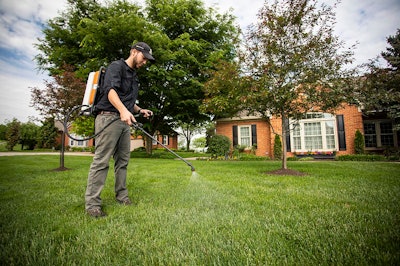Key Takeaways:
- Bethesda, Maryland has a humid subtropical climate with hot summers and mild winters.
- Soil in Bethesda is mainly clayey, which retains water but may cause poor drainage.
- Lawn care in Bethesda should consider the unique climate and soil composition.
- Zoysia, Bermuda, Kentucky Bluegrass, and Tall Fescue are suitable grass species for Bethesda.
- Factors to consider when choosing grass include sunlight, foot traffic, and soil conditions.
- Proper watering is essential with about 1 inch of water per week.
- Efficient irrigation systems, such as in-ground sprinklers or drip irrigation, can be implemented.
- Smart watering techniques include watering during early morning or late evening and collecting rainwater.
- Maintaining a regular mowing schedule and using sharp blades promotes healthy grass growth.
- Fertilization in spring and fall, along with aeration, helps maintain proper lawn health.
- Weed control strategies include regular mowing, proper fertilization, and targeted herbicide treatments if needed.
Understanding the Climate and Soil in Bethesda
The Unique Climate of Bethesda
The climate of Bethesda, Maryland, is humid subtropical with hot, muggy summers and moderate winters. The region experiences 40 inches of annual rainfall on average, spread evenly over the course of the year. While winters in Bethesda are usually mild, with temperatures ranging from the mid-20s to mid-40s Fahrenheit, summers there can be extremely hot, with highs in the high 80s to low 90s.
Many different types of grasses can flourish in Bethesda because to the city’s moderate winters and warm summers. However, it’s important to take into consideration the unique microclimate of your specific lawn and make adjustments accordingly.
Examining the Soil Composition in Bethesda
The soil composition in Bethesda varies, but clayey soils predominantly characterize it. Clay soils tend to retain water and nutrients, but they can also become compacted and drain poorly. This might make it difficult to keep your lawn healthy because too much moisture can lead to problems like root rot.
Before undertaking any lawn care activities, it’s crucial to analyze the soil in your lawn. You can use a soil testing kit or consult with a professional to determine the pH level, nutrient content, and overall soil health. This information will help you make informed decisions regarding fertilization, aeration, and other lawn care practices.
How the Climate and Soil Affect Lawn Care
The unique climate and soil composition in Bethesda have a significant impact on lawn care practices. The hot and humid summers require proper watering techniques and regular maintenance to ensure the grass stays healthy and green. The clayey soils, on the other hand, may necessitate additional steps such as aeration and soil amendment to improve drainage and prevent compaction.
Understanding the specific needs of your lawn based on the climate and soil composition is essential for successful lawn care in Bethesda. By adapting your approach accordingly, you can achieve a beautifully landscaped yard that thrives in the local conditions.
Choosing the Right Grass for Your Bethesda Lawn
Exploring Different Types of Grass Suitable for Bethesda
When selecting the right grass for your Bethesda lawn, there are several options to consider. Some of the most common grass species suitable for the area include Zoysia, Bermuda, Kentucky Bluegrass, and Tall Fescue.
Zoysia grass is noted for its high heat and drought tolerance, making it ideal for Bethesda’s scorching summers. Bermuda grass is also a popular choice due to its similar heat tolerance and ability to handle heavy traffic. Kentucky bluegrass is a cool-season grass that flourishes in Bethesda’s mild winters, but tall fescue is recognized for its adaptability to varied soil types and shadow tolerance.
Factors to Consider When Selecting Grass for Your Lawn
When choosing the right grass for your Bethesda lawn, there are several factors to consider. First, assess the amount of sunlight your lawn receives. Some grass species thrive in full sun, while others tolerate shade better. Additionally, consider the level of foot traffic your lawn receives. If you have children or pets who frequently use the yard, opt for a more resilient grass variety.
Soil conditions also play a crucial role in grass selection. Certain grass species perform better in clayey soils, while others prefer well-drained soils. Conduct a soil analysis to determine the pH level and nutrient content, as this will guide your grass selection and subsequent maintenance practices.
Maintaining the Health and Appearance of Different Grass Varieties
Each grass variety requires specific care to maintain its health and appearance. Zoysia grass, for example, benefits from regular mowing, proper watering, and occasional dethatching to keep it dense and lush. Bermuda grass thrives with regular fertilization and a consistent mowing schedule to encourage lateral growth and discourage weed development.
Kentucky Bluegrass requires frequent watering, especially during the hot summer months, to prevent heat stress. Proper fertilization and aeration are also essential to maintain its color and density. Tall Fescue, being a cool-season grass, requires less frequent watering but benefits from overseeding in the fall to repair any summer damage.
Essential Tips for Watering and Irrigation
Understanding the Watering Needs of Your Lawn
Proper irrigation is essential for maintaining a healthy lawn in Bethesda. Understanding the specific watering needs of your grass species and adjusting accordingly is essential for its long-term health. As a general rule, most grass types require roughly 1 inch of water per week, either through rainfall or irrigation.
Monitor the moisture level in your lawn by performing a simple “footprint test.” If the grass springs back after walking on it, it doesn’t need watering yet. However, if footprints remain visible, it’s an indication that your lawn needs watering.
Implementing Efficient Irrigation Systems in Bethesda
Consider installing an irrigation system that is suited to your lawn’s individual demands to ensure optimal water use. In-ground sprinkler systems provide uniform coverage and are programmable to water your lawn at specific times. This helps to prevent overwatering and encourages deep root growth.
Consider employing drip irrigation or soaker hoses in locations with clayey soils that run off easily. These systems send water to the root zone, minimizing waste and limiting soil erosion.
Smart Watering Techniques to Conserve Water and Promote Lawn Health
In addition to using efficient irrigation systems, there are several smart watering techniques you can employ to conserve water and promote lawn health. Water your lawn during the early morning hours or late evening to minimize evaporation. Consider employing drip irrigation or soaker hoses in locations with clayey soils that run off easily. These systems send water to the root zone, minimizing waste and limiting soil erosion.
Consider using rain barrels to collect rainwater for irrigation. Also, change the watering schedule in response to weather conditions. Reduce irrigation frequency during periods of heavy rains to minimize soil saturation.
Best Practices for Lawn Maintenance and Weed Control
Maintaining a Regular Mowing Schedule in Bethesda
Maintaining a regular mowing schedule is crucial for a well-manicured lawn in Bethesda. The recommended mowing height varies depending on the grass species, but a general rule of thumb is to never remove more than one-third of the grass blade at once.
During the growing season, mow your lawn about once a week to promote healthy growth and prevent the shade-loving weeds from developing. Use sharp blades to ensure a clean cut and avoid tearing the grass, which can make it more susceptible to diseases.
Nurturing Proper Lawn Health with Fertilization and Aeration
Fertilization and aeration are essential practices for nurturing proper lawn health in Bethesda. Fertilize your lawn in the spring and fall, using a slow-release fertilizer that provides the necessary nutrients over an extended period.
Aeration helps alleviate soil compaction by creating small holes throughout the lawn, allowing air, water, and nutrients to reach the root zone effectively. Depending on the soil condition, perform aeration once or twice a year, preferably in the fall or spring.
Effective Strategies for Weed Control in Bethesda
Weed control is an ongoing battle in any lawn, and Bethesda is no exception. Implementing effective strategies, such as regular mowing and proper fertilization, can help prevent weed development. However, for persistent weeds, spot treatments with targeted herbicides may be necessary.
Before using any herbicides, carefully read and follow the instructions to ensure safe application. Consider using organic weed control methods, such as hand-pulling or using natural weed killers, to minimize environmental impact.
By following the essential tips outlined in this guide, you can achieve a beautifully landscaped yard in Bethesda. Understanding the unique climate and soil composition, selecting the right grass species, implementing proper watering and irrigation techniques, and maintaining a regular lawn care routine will ensure your yard remains healthy and vibrant throughout the year.

